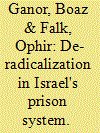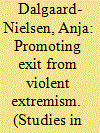| Srl | Item |
| 1 |
ID:
120434


|
|
|
|
|
| Publication |
2013.
|
| Summary/Abstract |
Acquiring and maintaining public support is frequently cited as an important requirement for governments fighting non-state actors. But how exactly can public support influence the course of counterterrorism campaigns and thereby contribute to an escalation or de-escalation of violence? This article argues that public support can provide a mandate for action but that it can also set boundaries for the measures governments and their non-state adversaries can legitimately use. Fluctuations in the quantity and quality of public support for either side can expand or contract these boundaries, potentially instigating marked changes in conflict-related violence levels and affecting the efficacy of government countermeasures.
|
|
|
|
|
|
|
|
|
|
|
|
|
|
|
|
| 2 |
ID:
120432


|
|
|
|
|
| Publication |
2013.
|
| Summary/Abstract |
An effective de-radicalization process in prisons is intended to facilitate the renouncement of violence and terrorism by those that have carried out such offenses. A key lesson that can be drawn from Israel's de-radicalization efforts is that it is possible, indeed recommended, to treat inmates-regardless of their level of radicalization-in a dignified and humane manner. However, Israel's ability to significantly de-radicalize security prisoners is limited if it is at all existent in its current form. Security prisoners with the potential for positive change should be placed in a different, perhaps foreign setting. This article provides an overview of Israel's prison system, the challenges it faces, its efforts to de-radicalize security inmates and suggests additional courses of action.
|
|
|
|
|
|
|
|
|
|
|
|
|
|
|
|
| 3 |
ID:
120435


|
|
|
|
|
| Publication |
2013.
|
| Summary/Abstract |
This article addresses the gap in the literature on U.S. domestic terrorism and counterterrorism in the 1970s by examining a once-notorious but now largely forgotten terrorist group, the Black Liberation Army (BLA). An outgrowth of the Black Panther Party, the BLA was directly responsible for at least 20 fatalities, making it amongst the most lethal "homegrown" U.S. groups of the period. This article seeks to shed new light on the BLA by exploring its relatively short but violent trajectory. By focusing on the group's origins, operations, ideology, and structure, the BLA can be understood as part of a wider landscape of homegrown political violence. The BLA emerged during the waning phase of a protest cycle that included the civil rights, Black Power, and anti-war movements. Like other terrorist groups before and after, the BLA claimed to be acting in self-defense and on behalf of the people, presenting itself as an army resisting police occupation of minority communities. With the collapse of the extreme Left in the mid-1970s, the BLA's prospects for creating a broader revolutionary base became remote. The article also examines law-enforcement responses to the BLA and the competing ways in which the Federal Bureau of Investigation and local police (and in particular, the New York Police Department) framed and countered the BLA threat.
|
|
|
|
|
|
|
|
|
|
|
|
|
|
|
|
| 4 |
ID:
120431


|
|
|
|
|
| Publication |
2013.
|
| Summary/Abstract |
A number of Western countries are currently adding exit programs targeting militant Islamists to their counterterrorism efforts. Drawing on research into voluntary exit from violent extremism, this article identifies themes and issues that seem to cause doubt, leading to exit. It then provides a perspective on how these natural sources of doubt might best be brought to bear in connection with an exit program by drawing on social psychology and research into persuasion and attitude change. It is argued that an external intervention should stay close to the potential exiter's own doubt, make the influence attempt as subtle as possible, use narratives and self-affirmatory strategies to reduce resistance to persuasion, and consider the possibility to promote attitudinal change via behavioral change as an alternative to seek to influence beliefs directly.
|
|
|
|
|
|
|
|
|
|
|
|
|
|
|
|
| 5 |
ID:
120433


|
|
|
|
|
| Publication |
2013.
|
| Summary/Abstract |
An ongoing debate among policymakers and terrorism scholars concerns the effectiveness of deterrence as a counterterrorism tool. Absent from the debate is a discussion of the complex nature of terrorist decision making. Decisions are made at varying levels in a terrorist organization, often by actors having different motives, resulting in behavior that is not always fully rational. This article identifies several circumstances when terrorist behavior is not the product of an entirely unitary, rational decision-making process, and therefore highlights when deterrence policies will be least effective. It concludes with some policy implications for understanding when deterrence policies are most likely to succeed and how to address terrorism in other situations.
|
|
|
|
|
|
|
|
|
|
|
|
|
|
|
|